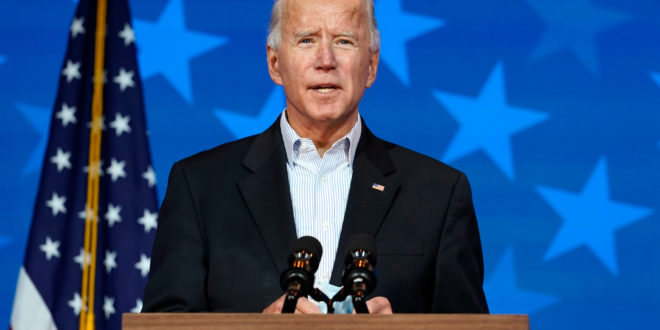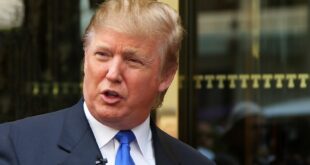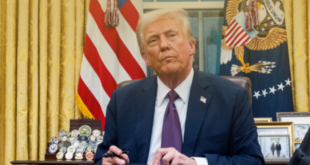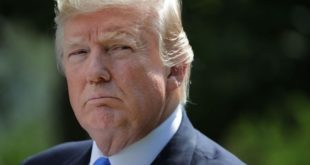US President-elect Joe Biden has formally introduced the first people he has chosen for his cabinet, as the transition of power gathers pace.
If confirmed, Avril Haines would be the first female director of national intelligence and Alejandro Mayorkas the first Latino homeland security boss.
John Kerry will be climate envoy, while foreign policy veteran Antony Blinken is nominated for secretary of state.
President Trump has now agreed that the transition process should start.
However, he still refuses to concede defeat. He said the General Services Administration (GSA), which oversees the handover, must “do what needs to be done” but continues to repeat unsubstantiated claims that the 3 November election was “rigged”.
Mr Biden can now access millions of dollars in funds, national security briefings and key government officials to properly prepare to take over the presidency on 20 January.
In a very brief appearance in the White House press room on Tuesday, Mr Trump praised the work of his administration, hailed the Dow Jones stock index for passing the 30,000 mark and left without taking questions.
Mr Biden is projected to beat President Trump by 306 votes to 232 in the US electoral college when it meets to formally confirm the winner on 14 December. This is far above the 270 votes he needs.
On Tuesday, Governor Tom Wolf said he had certified the victory of Mr Biden in Pennsylvania, one of the key swing states. Another, Michigan, certified the same result on Monday.
Who has Biden picked?
Many of the choices are Mr Biden’s colleagues from the Barack Obama administrations.
Presenting his nominations, Mr Biden said the team would “make us proud to be American”.
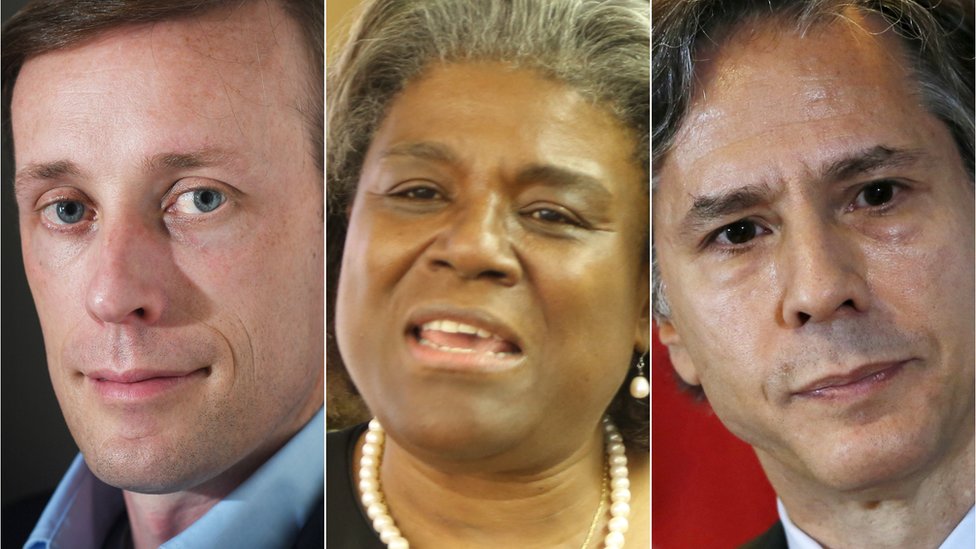
Mr Biden presented six key picks on Tuesday:
- Antony Blinken was nominated as secretary of state – the most important foreign policy position. He is expected to manage a Biden foreign policy agenda that will emphasise re-engaging with Western allies
- Ex-US Secretary of State John Kerry will lead the incoming administration’s effort to combat climate change. He was one of the leading architects of the Paris climate agreement, which President Trump withdrew from
- Avril Haines, a former deputy director of the CIA, was nominated as the first female director of national intelligence
- Alejandro Mayorkas was the first Latino nominated to serve as secretary of homeland security. He previously served as deputy secretary of homeland security under President Obama
- Jake Sullivan was named White House national security adviser. Mr Sullivan served as Mr Biden’s national security adviser during Mr Obama’s second term
- Long-time diplomat Linda Thomas-Greenfield was nominated US ambassador to the UN. She also served under President Obama, including as assistant secretary of state for African affairs between 2013 and 2017
One choice that is expected but has not been announced yet is former Federal Reserve chair Janet Yellen as Treasury secretary
The BBC is not responsible for the content of external sites.View original tweet on Twitter

Most of the picks, although not Mr Kerry nor Mr Sullivan, will need confirmation by the Senate. Rejection of a nominee is rare. The last was in 1989, although some nominees have withdrawn from consideration.
Mr Biden’s first TV interview as president-elect is scheduled to air in the US on Tuesday evening.
It is not yet clear when Mr Biden will be given his first classified national security briefing as incoming president. The so-called Presidential Daily Brief gives Mr Trump details of the latest international threats and developments.
Meanwhile, the transition website has now switched to a .gov domain.
Joe Biden’s picks for the top roles in his administration have been celebrated by centrist Democrats: they speak glowingly of the diversity and experience of the individuals, a group that includes veteran foreign policy experts, and accomplished women and people of colour.
Yet progressives feel cheated. They say they helped Mr Biden win, and now they have been shut out of power.
These progressives say the cabinet will be filled with “Clinton and Obama retreads”, as one of them puts it, describing it as a return to the “Blob”, a term that Ben Rhodes, who served as Mr Obama’s speechwriter, once used to describe the Washington establishment.
Stephen Wertheim from the Quincy Institute, a think tank focused on foreign policy, says the new Democratic team in the White House may end up acting like the old one, a group of centrists who, he says, focused more on military threats than on issues such as climate change. He adds: “Progressives have a right to be concerned about whether there will be significant change.”

What are Republicans saying?
While the nominees bring decades of diplomatic experience to the White House, they also face criticism from those who object to the baggage that comes along with years of serving the US government.
However, Republicans in the Senate have so far mostly remained quiet on Mr Biden’s picks.
President Trump continues to allege massive voter fraud without providing evidence, and his legal challenges have so far proved fruitless.
On Tuesday, he reiterated that he had not yet conceded, by tweeting that the GSA “does not determine who the next President of the United States will be”.
Although most of Mr Trump’s fellow Republicans have united behind his refusal to accept defeat until now, some have begun to break rank.
Tennessee Senator Lamar Alexander, who is retiring, said the president should “put the country first” and help Mr Biden succeed.
“When you are in public life, people remember the last thing you do.”
West Virginia Senator Shelley Moore Capito said “at some point, the 2020 election must end”.
BBC.COM
 Home Of Ghana News Ghana News, Entertainment And More
Home Of Ghana News Ghana News, Entertainment And More
